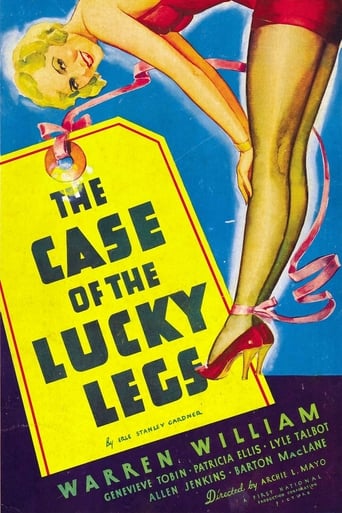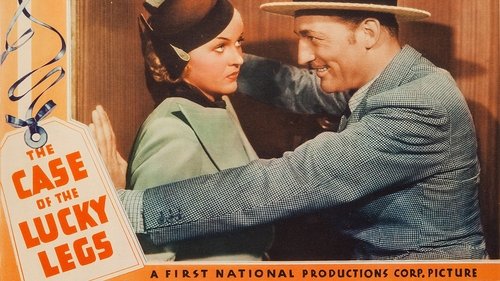Edgar Allan Pooh
. . . states "Not your papa's Perry Mason." No kidding. If you actually think about it, this aged six-pack is GREAT-GRANDDAD's Perry! From the first to this third series entry, Warner Bros. does one of the greatest makeovers in a single year in the history of any movie franchise. The opening shots of Perry's initial film (THE CASE OF THE HOWLING DOG) shows Mr. Mason occupying an entire high-rise floor, with scores of employees, including an in-house shrink and a private eye squad. He also needs nearly as many switchboard gals as Ma Bell. Presumably, the Depression hit Perry harder than most. By his third entry, THE CASE OF THE LUCKY LEGS, he's down to just two employees, one of whom works out of a modest office suite. (The other, "Spudsy," seems to be based at home sometimes, and on sidewalk benches the other nights.) As a recovering alcoholic, Perry's biggest concern in LEGS is, "Got milk?" His replacement secretary "Della Street" actress (Geneieve Tobin) is far Floozier than the original Della (Helen Trenholme). Plus the tone of LEGS has degenerated to a constant patter of cheap one-liners (the kind Bob Hope got two for a quarter at this time). Since three more Mason flicks followed LEGS, Great Grandpa must have been pretty easy to please.
SimonJack
I wonder what the younger audiences thought who saw the first Perry Mason movies in the 1930s, and then saw the Perry Mason TV series that began in 1957. Were they disappointed by the changed character and his venue? As some people seem to be today with the earlier films – those being people who grew up on the TV series that starred Raymond Burr. A number of other viewers have related that author Erle Stanley Gardner didn't like the direction, scripts and characters of his first books put on film. And this one, "The Case of the Lucky Legs," got his ire up the most. Supposedly, that led to his eventual efforts to serialize his stories on TV. So, now we're stuck watching with the audience of 1935 this third film about Perry Mason, and the third starring Warren William. We've already seen considerable changes in character and his venue in these three films. He started off with a big office, law partners and his own investigative staff. In Lucky Legs, he's almost down and out, and a one-man show, but with sidekicks and friends. This third film is the weakest of the mystery genre, mostly because the mystery is almost lost in the comedy. Indeed, there's so much comedy here, that the mystery is clearly an adjunct to the comedy with all its antics, witty exchanges and hilarious scenes. On second thought, the comedy may well have been invited because the mystery in this film is not that good or complicated. Plus, Warner Brothers had seen by then the success that MGM had with "The Thin Man," and how audiences loved the comedy of the Nick and Nora Charles mystery.This film opens with a changed Perry from the earlier two films. He's a boozer whose health is in jeopardy. So, his friend, a doctor down the hall (played wonderfully by Olin Howland) prescribes rest and puts him on a heavy liquid diet that excludes anything alcoholic. Perry asks, "Are there any other liquids?" Della (played to maximum hilarity by Genevieve Tobin) replies, "Milk." Perry says, "Milk. You mean that unpalatable by-product of the cow?" Doctor Croker (Olin Howland) says, "Exactly! No excitement whatsoever, and no stimulants." Perry: "Did you get that, Miss Street? No stimulants and no excitement. I'll have to get rid of you." Della: "Thank you, you flatterer."This film in places borders both on slapstick and on screwball comedy. It doesn't quite get there for either sub-genre, but the result is a mix of all types of humor with nice doses of slapstick and screwball throughout. Perry is at his height here for flirting and womanizing, but this is done only by insinuation and suggestion. I rate this film a notch lower than the first two of the series because I think it loses its mystery appeal. To the point that the comedy almost dismisses the crime of murder. But, as a very good comedy, this film stands on its own. Here are some snippets of dialog to tickle one's funny bone. District Attorney: "Bizzy, why do your men always arrive at the scene of a crime just after Mason?" Police Chief: "Well, I suppose it's because before they decide to a commit a murder, they hire Perry Mason to defend 'em."Police Sergeant: "Who was that on the phone?" Della: "The garbage man. I told him to send up enough for four."Airport steward: "I dropped him in a bus for the Lakeview Hotel." Perry: "You haven't got a lake here, have you?" Steward: "No, but the hotel has beds for you lie down on." Perry: "That's a very clever remark." One can see that the other two men are almost cracking up – which leads me to think that there may well have been some impromptu lines at times – especially from Warren William, that the director kept in the film. One has to love and laugh at exchanges like this. A Lakeview Hotel, but no lake. And that's OK because the hotel still has beds. In a scene toward the end, Della is exhausted and is lying on the office sofa with her head turned toward the sofa back. Perry unlocks his back door and enters the room. Without turning her head to look at Perry, Della says, "Come right in and sit down, please. If you're looking for Mr. Mason, I don't know when the gentleman will be back." Perry says, "The gentleman is here." Della replies, "Oh, ha, don't lie to me. You're no gentleman. You're Perry Mason."
GManfred
Gosh, where to start. The name Perry Mason has a cachet about it, derived in part from the 50's TV series and from the books written by Erle Stanley Gardner. I wonder what Mr. Gardner would have thought about how Hollywood wrecked one of his best-sellers with the god-awful treatment found in "The Case Of The Lucky Legs".It is presented as a comedy-mystery, accent on the comedy angle. Did audiences find this stuff funny in the mid-30's? Did they notice the many loopholes in the plot left unresolved? More importantly, did Archie Mayo, a veteran Hollywood director, mail this one in? read some other reviews for a plot rundown, but there is very little to recommend this picture to unsuspecting viewers, save for Genevieve Tobin, who plays Della Street. She, at least, emerges with her dignity intact. This picture is illogical, the plot far-fetched and as funny as a funeral cortege.
Shane Crilly
Raymond Burr's Perry Mason of the fifties practically defined the law to a whole generation of boomers. Words like incompetent, irrelevant and immaterial were on the lips of kids of all ages. Burr made defense attorney the highest calling imaginable. The thirties version is different. it's entertaining, but in a light comic way reminiscent of the Thin Man series. Warrem Williams plays for laughs and like the thin man is often drinking. The pace is snappy and keeps the interest from flagging. You won't be bored, but don't expect anything like the classic TV series.Missing here - believe it or not there's no courtroom drama, not even a surprise confession from the character you hardly noticed until Mason started his penetrating questions. There are no penetrating questions for that matter. Paul Drake is "Spudsy" Drake and, like his name, inserted for comic effect. The cops are more keystone and there is no Hamilton Berger D.A.On the whole OK, but more interesting as a comparison that shows what the 50's television series achieved and what changes made it possible.




